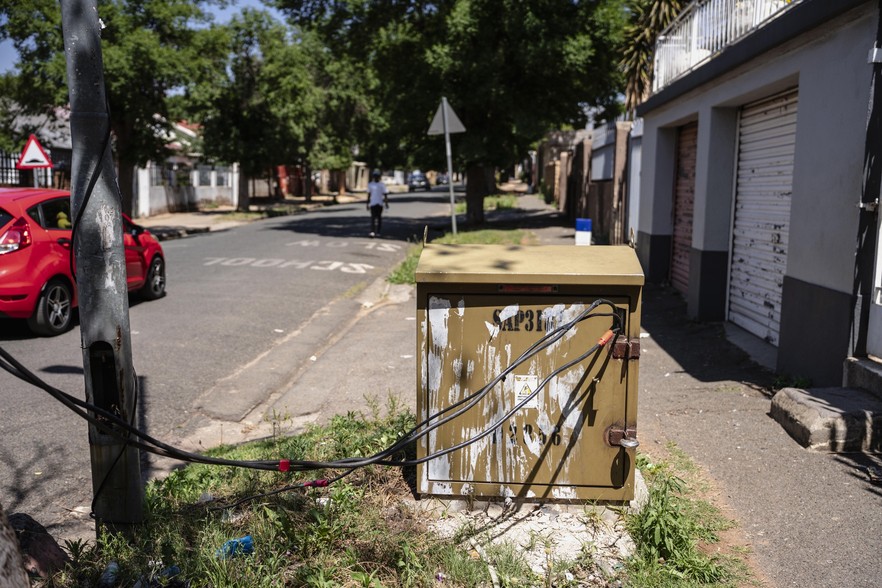
28 October 2025
Illegal electrical connections in Kensington, Johannesburg. Photos: Ihsaan Haffejee
Johannesburg’s cable theft crisis has forced communities to pick up the slack left by City Power and the South African Police Service (SAPS). With City Power already struggling to maintain its core operations, and SAPS similarly overburdened, residents across the city are using what resources they can to keep the lights on.
Inequality in resources available to residents — from security guards and surveillance in some areas to unarmed community foot patrols in others – determines how different parts of the city experience and respond to electricity-related crimes.
In the middle and upper class suburbs of Greenside, Parktown North and Kensington private security firms have taken a frontline role in protecting electricity infrastructure. Security officers often encounter cable thieves during routine patrols, act as first responders and share crime intelligence with the police.
Locks and chains can be seen on electrical infrastructure in Kensington.
City Power formalises this cooperation through signed Memorandums of Understanding (MOUs) with security firms and residents, as part of their Community Partnerships Program.
“The Community Partnership Programme is an initiative in which businesses, customers, security companies, and residents’ associations voluntarily adopt and protect City Power’s network infrastructure. The application form is available at the City Power Security Risk Management Department,” Isaac Mangena, City Power Spokesperson, told Our City News (OCN).
“Currently, City Power has signed over 800 Community Partnership agreements.”
The terms of the agreements vary across different communities.
“We pay about R450 a month to a security company that not only patrols our boxes and substations, but keeps them under lock and key. They only open for contractors who are verified by City Power,” said Judith Ancer, member of the Greenside Residents Association.
“Secure infrastructure should be covered by our rates. We’d much rather spend the extra money on beautifying our local park, or another need, but we had to start with the basics,” she added.
Ancer said that at the height of their cable theft crisis, the area was plagued by weekly incidents of theft and vandalism.
“We’d hear a big explosion in the middle of the night and just know that we’re waking up to no power in the morning.”
Around the time that the Greenside and Parktown North MOUs were signed in 2019, City Power also replaced the overhead copper cables with aluminium that has much less resale value. Ancer said that following those two interventions, incidents of infrastructure vandalism and theft are now few and far between in Greenside.
In Kensington, an MOU with City Power dictates that when residents or security guards report a crime through a dedicated hotline, City Power must respond within two minutes to cable theft reports and within two days to reports of illegal connections.
Richard Francis, Chairperson of the Cleveland Community Policing Forum (CPF) told OCN that City Power’s quick response time has been especially helpful for prosecuting electricity crimes.
“By law, City Power is the only party that can identify their property and open a criminal case against suspects that we apprehend. Now that they come out so quickly, they’re opening more cases,” said Francis.
Richard Francis, chairperson of the Cleveland Community Policing Forum in Cleveland.
The Cleveland precinct comprises a mix of middle to upper class suburbs of Kensington, Bruma and Cyrildene and low-income neighbourhoods like Cleveland, Malvern and the Jampas township. These areas border the inner-city Jeppe precinct, one of the top ten crime hot spots in the country.
“In addition to private security services, our more affluent residents also have security cameras. These resources are what we call force multipliers, they boost our fight against cable theft. In the poorer areas, the only force multipliers are the residents themselves,” said Francis.
In Jeppe and parts of Cleveland where residents can’t afford private security services, community members volunteer for neighbourhood watch foot patrols to guard their infrastructure.
“There are very few private security role players in our areas. As a low-income community we are unable to absorb the costs,” Jeppe CPF Chairperson Zenzile Ayanda told OCN. The Jeppe Precinct borders Cleveland’s low-income areas and the two CPFs often work together in crime hotspots.
Both Zenzile and Francis say that cable theft and damage to the electricity infrastructure are daily occurrences in the Jeppe-Cleveland area. Patrollers regularly encounter people stealing cable and vandalising infrastructure.
“It’s very dangerous to approach them. We are unarmed, and they’ve opened fire on our patrollers before,” said Zenzile.
Zenzile complained that City Power is not supportive or responsive to their efforts.
“We’ve never had City Power’s involvement in our raids on scrap dealers in the area. When we find stolen copper, we call and call and no one comes to identify their property. They have a bad attitude toward us.”
Mangena told OCN that City Power provides security support and responds to incidents in all parts of the city without distinction between rich and poor. However, inner city areas such as Malvern and Jeppe have been identified as high-risk zones where not only is infrastructure under attack, but so are staff and contractors who enter those areas.
“These risks make it increasingly difficult to provide consistent on-the-ground security support in such areas,” he said.
Illegal electrical connections in Malvern.
Mangena said that while City Power spends R100-million on private security services to safeguard their infrastructure, “our primary responsibility is not to secure infrastructure”.
That is the oversight of public safety and security services like the Metro Police and SAPS.
City Power loses about R25-million a month to theft and vandalism. According to the Auditor-General’s report, City Power lost about R3.5 billion in the 2023–2024 financial year due to non-technical losses like theft and illegal connections. This year, the utility has so far suffered losses of R114 million because of cable theft alone.
Damaged electrical infrastructure in Malvern.